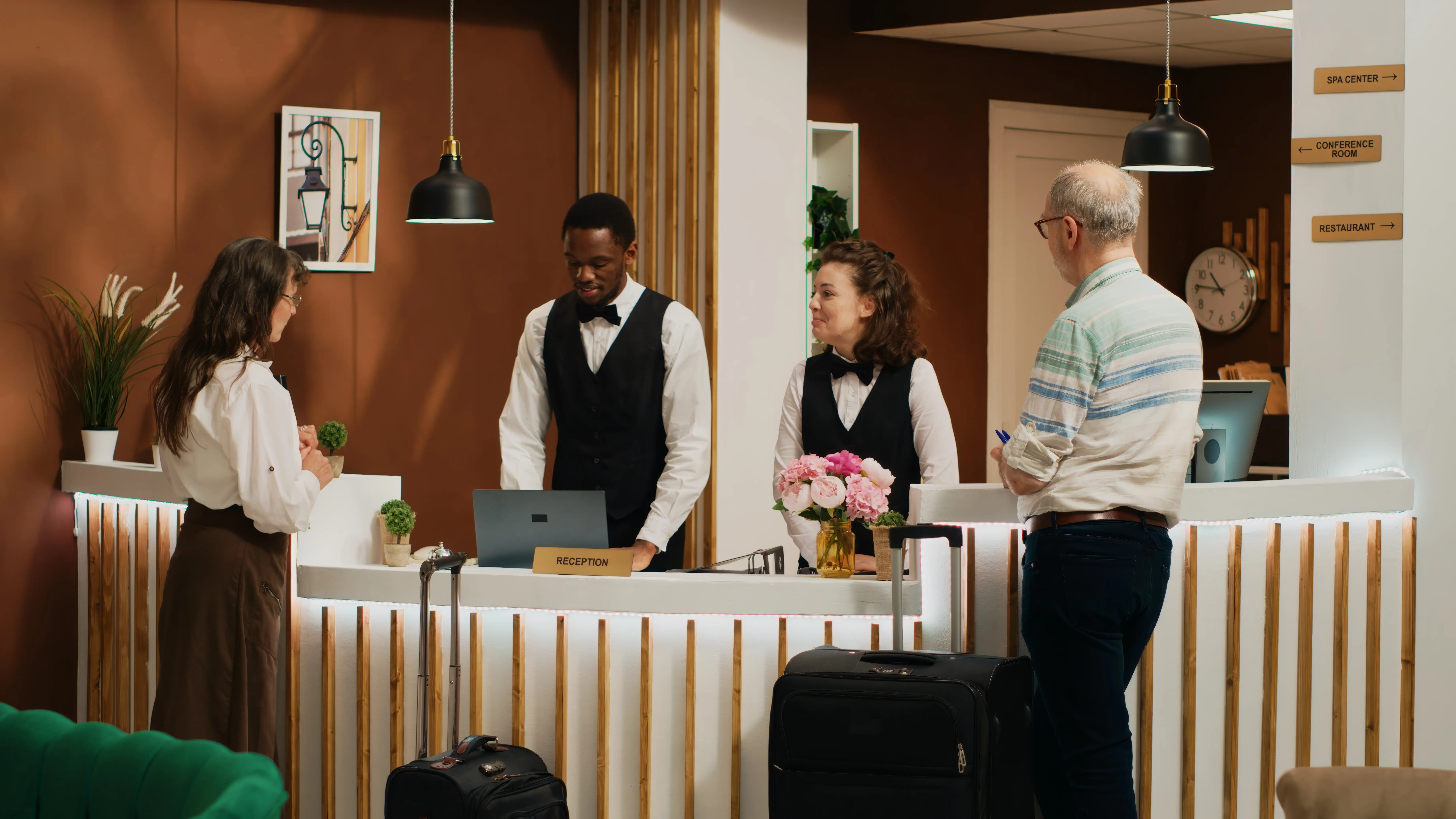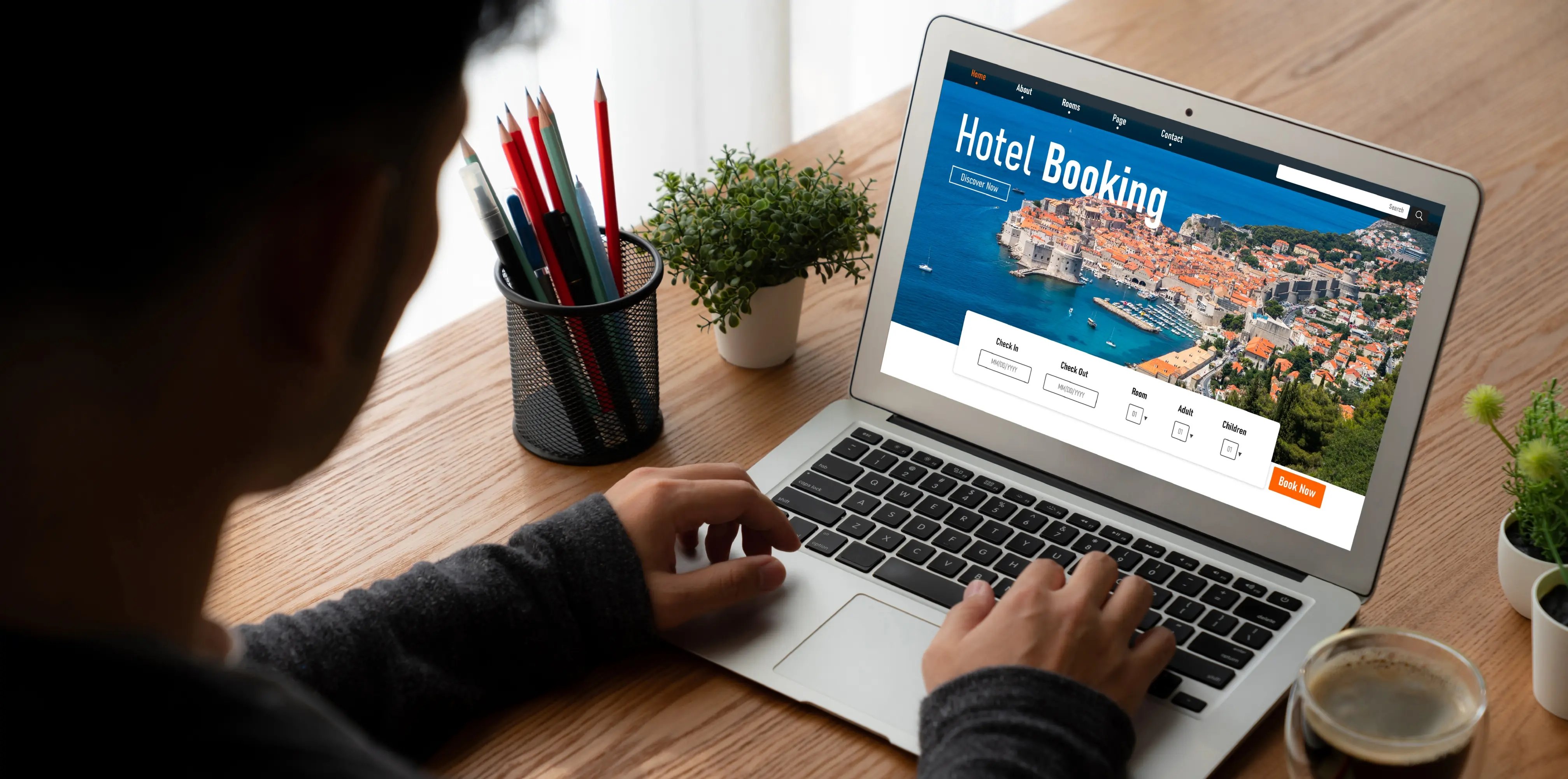How to get more direct bookings?
There are many examples in business where ‘middlemen’ are important, acting as agents between a producer and consumers, whether in food supply chains, or insurance services. In the hospitality industry there are also middlemen, and in this article we’ll be examining how essential they really are and if direct bookings for your hotel can be increased without them.
Traditionally, guests booked their hotel of choice directly, through writing, or telephone. Then along came travel agents to connect a wider range of guests to a larger array of hotels, in a greater variety of countries. From the 1990s, a new form of middleman emerged in the shape of Online Travel Agents, or OTAs. The power and reach of these companies - such as Expedia, Booking.com and Travelocity - became so deeply established in the hospitality industry that they rose to be a significant channel by which guests make their bookings. 2023 figures for U.S. hotel bookings show that 36% of bookings are made online, with other estimates showing online bookings worldwide in the region of 70%. ‘Only’ about a quarter of this percentage is taken by the Online Travel Agents, but nevertheless the OTAs have helped to massively grow markets. At the same time their charges of between 15-30% commission can take a hefty chunk out of the profitability of hotels. Now, in part through the adoption of sophisticated and readily-available technologies, hotels are able to counter the might of the OTAs and restore the balance of increased direct bookings - where the contact between guests and the hotel is not mitigated by a third party. As a result a hotel’s bottom line can be significantly improved.
Why direct bookings are beneficial
The overriding case for increasing direct bookings is to counter the loss of income through the commission paid to OTAs. Direct booking has other drop-down benefits however:
- It enables hotels to get closer to their customers and create niche marketing opportunities for specific groups.
- Hotels can access data and analyse their sales in granular detail that was previously only the province of the OTAs.
- The restrictive template format that most OTAs use leads to a ‘sameness’ which often doesn’t do justice to hotels. By developing an individual website and offering, hotels can express more of what they stand for - their brand values.
- When hotels are not constrained by the rules of the OTAs they can adjust pricing and policies more flexibly, and respond to changing circumstances without the need to consult with their OTA partners.
- Local conditions, events, and seasonal activities can often be leveraged more effectively when a hotel takes control of promotion and marketing directly.
- Oh - and did we mention this already - what hotel manager ever likes to throw away 15%-30% of their profits?
Pros of using OTAs
Of course the Online Travel Agents are far from the bad guys in the equation: They have played an important part in growing the hospitality market, and are hugely trusted by consumers. Most importantly the OTAs have massive ‘reach’ so that potential guests anywhere in the world can search for, find, and book a hotel anywhere. But as consumers have become ever more adept at doing their own searching for products, and booking them, hotels that make it as easy for guests to book through their website as through Online Travel Agents, open up new possibilities and the potential to radically boost their bottom line.
Worldwide, the top ten Online Travel Agents by revenue run from Booking.com, Expedia and then Airbnb, through to Tripadvisor, currently in the number ten spot. They all offer a similar service - connecting potential guests with places to stay - but with some differences. Booking.com for instance offers a wide range of property types, from resorts and luxury hotels through to more modest dwellings. Airbnb began as essentially a home or even room sharing platform, and is still rooted in that model of private property ownership (although it has expanded greatly from its humble beginnings). But whatever the differences between OTAs, they all offer the same basic service: A massive shop window that exposes properties anywhere in the world to potential guests.
Leveraging the billboard effect
For hotels which decide to put energy into pursuing their own direct bookings route, the power of the OTAs is still well worth plugging in to. Being listed with Online Travel Agents also promotes the well-observed ‘billboard effect’, where guests browse OTA sites for a quick sweep of what’s available in the area they wish to stay (and at the price they wish to pay), and having made a shortlist, then go directly to the hotel’s own website to make their actual booking. This is great news for the hotel, which won’t have to pay the OTA commission, but - and this can be a big BUT - everything about how the hotel presents itself must be up to scratch. Let’s see what this means:

Strategies to increase direct bookings
- Know Your Customer: The principle of knowing your customer is key to the success of all businesses, and applies even more in the people-to-people hospitality industry. It’s not possible to appeal to everyone, so knowing your target audience means you can speak more directly to them and fulfil their needs and wants more effectively. The OTAs have been able to utilise their data analysis capabilities to do this, identifying specific demographics and then targeting them. Now individual hotels can mine their own data: You can see the age and socio-economic profile of guests. When do they stay, and for how long? What do they spend their money on while in-stay - health treatments, food and beverage, tourist trips? The more you know, the more you can target and make new offers. Seasonal trends can also be defined, and then responded to: Analyse where there are periods of maximum demand, and when there’s a slump. Of course experienced hotel managers have always done these things, but not with anything like the degree of responsiveness and accuracy that comes with a smoothly functioning PMS. Knowing your customer is a superpower!
- Partner up: The demographics of your guests will help guide you towards the hugely effective strategy of partnering with other businesses and organisations in the area. Why be ‘standalone’ when there are opportunities to create joint promotions which are mutually beneficial? There are so many events, seasonal activities and places of interest that can be partnered with, bringing dual marketing and promotional firepower to bear, and creating opportunities for cross-selling. It requires some creative brainstorming, but wherever your hotel is located, there will be other businesses in the area that you could benefit from ‘piggybacking’ with. Think local wineries, surfing schools, artists, historic sites, woodland walks, cafés, craft shops and artisan food outlets. Cross promotion can work wonders, and it’s always useful to have others share in the ‘heavy lifting’ of marketing and outreach.
- Make your social media hum: Social media is one of the most important gateways that potential guests use to assess whether a hotel is suitable for their needs, and previous guest reviews form a vital part in the decision to book a hotel. Constantly monitoring social media to see what past guests have said about your hotel is hugely important. If they’ve been complimentary, use that to amplify the message. If they have been critical in some way, then respond politely and firmly (but never get into a debate!) Show that you are aware and proactive and know how to leverage the medium. This includes regularly making new and attractive posts, including great images and videos, and tying these in to local events and seasonal activities. This is where local partners can also be great allies. Social media presence is a must-have for every hotel and is an important tool in boosting direct bookings. Remember the billboard effect? - Potential guests will search on the OTAs, and then refine their shortlist. What they find on the hotel website and on social media will likely determine their choice of hotel.
- Manage and enhance your reputation: Hotels establish their reputation over a long period of time, and become known for some of their primary attributes. These can include quality, friendliness, luxury, excellent service, fine dining, sportiness… or a host of other indicators of guest satisfaction. However, as with Knowing Your Customer, it’s not possible to be all things to all people. So it’s important to understand what your reputation is built on, and then enhance and preserve this. These qualities form your brand reputation and must be protected and developed. Reputation takes a long time to establish, and can be quickly damaged, so being very aware of how your hotel is perceived, and protecting that image is vital.
One of the downsides of the OTA ecosystem is that it tends to treat all hotels as the same and present them within a standardised format. That’s useful for potential guests to shop around, but it doesn’t really show off an individual hotel to its best advantage. Reputional management redresses that.
Curating the hotel's website
It should be obvious that the hotel website must be user-friendly and easy to navigate, but is that truly the case? When was it last refreshed or ‘stress-tested’ to see if it really performs as it should? Engaging with your website must be a seamless experience for visitors. That way they will be encouraged to book directly.
Your website should emphasise what makes your hotel unique, such as special amenities, or the prime location. This means describing the facilities in well-written, concise headlines and sentences, and most of all using great images - both still shots and video clips. These are what will make your hotel come alive for guests, and showcasing these aspects can convince guests to book directly. Always highlight your unique selling points, in images and text, and make sure all the information is current!
Keeping information current means that you must curate your website, ensuring that old events and offers are deleted, and that attractive upcoming initiatives are seen front and centre. Don’t still show your Christmas offers in February! Curation of your website means regular and proactive vigilance to ensure that every aspect is on point and telling the right story.
Keeping your technology up to date is also vital. Just because your website used to function satisfactorily for guests using their home computers to search and book doesn't mean it’s still suitable for the modern world. Over 50% of searches and bookings are now made through mobile devices, so ensuring that your website is ‘mobile friendly’ is an absolute must.
However, getting the technology ‘singing’ goes a lot further than being merely mobile-friendly. Part of the reason for the global success of the OTAs is that they are able to data mine and analyse guest choices, so that they understand trends, cost structures and why people decide on a particular hotel. Until recently this kind of information has been beyond smaller hotels. Now, with the advent of highly sophisticated, but affordable cloud-based Property Management System solutions for the hospitality industry, in depth information is available to any hotel with a modern PMS.
The power of a PMS
A Property Management System in many ways replicates the facilities of the OTAs, enabling guests to search and book directly with a hotel, through the hotel’s own Payment Gateway. Chatbots and virtual assistants can be embedded in the hotel website, working 24/7 to talk guests through their booking (and can recognise and respond in a variety of world languages). Even at this fully automatic stage the potential to upsell is available, as the bot can offer room upgrades or special packages. Making the actual booking is easier for both guest and staff as all of the data is entered directly by the guest into the hotel’s own PMS, so it’s accurate, and takes less time to process. Furthermore the booking is made at the time of the guest’s choosing, and doesn’t tie up staff at periods of maximum activity.
Once the booking is made, the PMS sends out automatic confirmation emails, and from then on maintains a running dialogue with the guest as the date of arrival nears. This communication is always personalised - one of the key hospitality trends of recent years. The guest’s name and title are always used, and rather than it being a bland ‘one size fits all’ email, the hotel can also customise the messaging with its own logo or imagery.
Because the PMS is ‘cloud-based’ it can be constantly upgraded from a remote location (so no more inconvenient visits from IT engineers), meaning that the software is always 100% up to date, with all the latest ‘bells and whistles’ being deployed.
Direct booking solutions with a PMS
SabeeApp’s software suite provides all the tools needed to automate hotel operations and grow your business. These include:
- Booking Engine: to turn your website into your most successful sales channel. With our Booking Engine, direct commission-free reservations can be boosted by 20%. That means saving on commissions, increasing your revenue and having more direct control of your guests' experience.
- Channel Manager: ensures that the room inventory is accurately reflected across all platforms (including OTA partners) and minimises any risk of overbooking. You can also increase your property's revenue with the SabeeApp Channel Manager by optimising pricing, increasing occupancy, and reaching new audiences through multiple channels.
- Payment System: The SabeePay hotel payment system streamlines the entire payment process by automating manual data entry, guest communication, payment processing, and invoicing. And when making reservations through the Channel Manager or Booking Engine, payment methods are included, which eliminates the need for manual data entry.
- Enhanced Communication: SabeeApp’s platform greatly enhances communication with guests, as well as internally within the hotel, across all departments - for example, synchronising front desk, maintenance and housekeeping for more effective operation, and an enhanced guest experience.
These are just a few of the key points that come with a modern and seamlessly operating Property Management System, and we have confidence in stating that the SabeeApp approach is second to none. That’s why we offer a free, no obligation demo of our system - to show you how comprehensive, effective and affordable our offering is.
We firmly believe that when you see how our PMS and Smart Solutions software suite can enhance your business and boost the bottom line, you’ll be convinced of its merits. But is that all there is to getting more direct bookings? Well, actually, there are further actions which need to be taken to really push your hotel up the rankings.

Introducing SabeeApp
We know all this because we are SabeeApp, and have been supplying our PMS to the hospitality industry for over a decade. We are intimately involved in growing the success of our client hotels, and are constantly developing new and improved solutions. As a result, hotels using SabeeApp’s PMS and associated suite of Smart Solutions are now able to match the power and data mining capabilities of the OTAs, supplying easy and reliable booking and payment for guests, and personalised communication pre-stay, during stay and post-stay. The advice we offer is based on our vast experience gathered from around the world, and which we share with client hotels, as well as those businesses still considering whether to engage with a modern Property Management System, or stay hooked up with the OTAs. Our answer? - Do both, and prosper!
The benefits of increasing direct bookings
While OTAs play a crucial role in the travel industry, hotels need to carefully weigh the benefits and drawbacks of using the system. Many hotels adopt a balanced approach by leveraging the reach of OTAs while actively promoting direct bookings through their own websites. The goal is to maximise revenue, maintain brand control, and build long-term relationships with guests.



